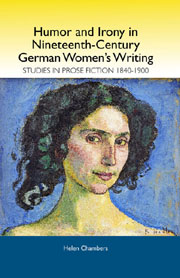Book contents
- Frontmatter
- Contents
- Acknowledgments
- Introduction
- 1 Annette von Droste-Hülshoff and Ida Hahn-Hahn: Overcoming Seriousness?
- 2 Ottilie Wildermuth and Helene Böhlau: Harmless Humor or Subtle Psychology?
- 3 Marie von Ebner-Eschenbach: Satire, Physical Comedy, Irony, and Deeper Meaning
- 4 Ada Christen and Clara Viebig: Laughter and Pain in the World of Work
- 5 Isolde Kurz and Ricarda Huch: The Humor of Skeptical Idealism
- Conclusion
- Works Cited
- Index
5 - Isolde Kurz and Ricarda Huch: The Humor of Skeptical Idealism
Published online by Cambridge University Press: 05 February 2013
- Frontmatter
- Contents
- Acknowledgments
- Introduction
- 1 Annette von Droste-Hülshoff and Ida Hahn-Hahn: Overcoming Seriousness?
- 2 Ottilie Wildermuth and Helene Böhlau: Harmless Humor or Subtle Psychology?
- 3 Marie von Ebner-Eschenbach: Satire, Physical Comedy, Irony, and Deeper Meaning
- 4 Ada Christen and Clara Viebig: Laughter and Pain in the World of Work
- 5 Isolde Kurz and Ricarda Huch: The Humor of Skeptical Idealism
- Conclusion
- Works Cited
- Index
Summary
Lebensdrama
Leben, du spielst mir so kraus, als wärst du von Shakespeare gedichtet,
Tragisch-verzweifelter Not mengst du barocken Humor.
In zermalmendem Ernst groß schreitend rührt mich das Schicksal,
Aber mit Schellengeläut' zupfen die Clowns mich am Rock. —
Plötzlich steh' ich verzückt und staun' und lausch' in die Lüfte,
Denn aus den Bäumen hervor tönt es wie Ariels Lied.
ISOLDE KURZ, LIKE OTTILIE WILDERMUTH a generation earlier, grew up in Swabia, but in an unconventional household, as the daughter of humorous writer and quiet scholar and translator Hermann Kurz, latterly a librarian at Tübingen University. Her aristocratic mother, Marie, née von Brunnow, a committed democrat and politically active in 1848, was an energetic, volatile woman who took charge of her daughter's education, taught her modern languages, and gave her socialist writings as well as the classics to read, so that Kurz felt as if she grew up with the Greek gods and heroes for playmates. Unlike her brothers, she had no formal schooling or university education. Despite her mother's freethinking, frequently chaotic household, as the only girl, Kurz still had to play the conventional female roles of dutiful daughter to her father and emotional prop to her mother, and peacemaker in general. She compares being with her mother, which she was for most of her life, until Marie's death in 1911, to living on the edge of an active volcano.
She resisted maternal pressure to marry and considered what she saw as the woman's inevitable subordination of creativity to erotic demands incompatible with an artistic vocation. From the age of twelve writing was a commercial activity.
- Type
- Chapter
- Information
- Humor and Irony in Nineteenth-Century German Women's WritingStudies in Prose Fiction, 1840–1900, pp. 155 - 195Publisher: Boydell & BrewerPrint publication year: 2007



